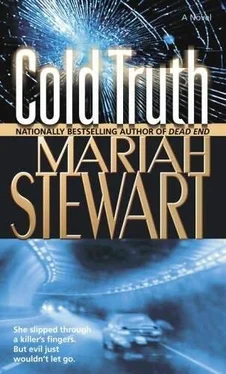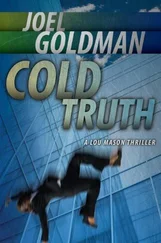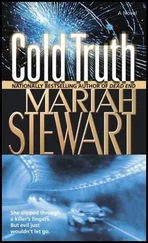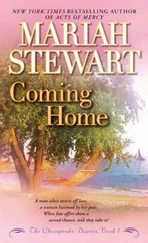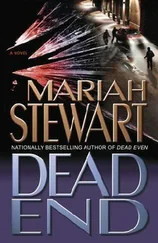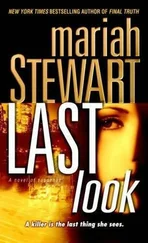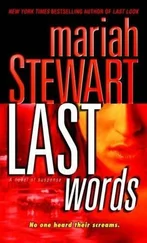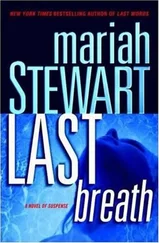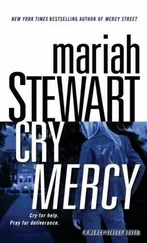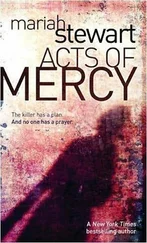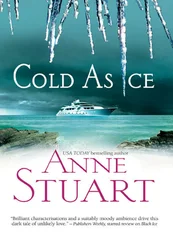Of course, that was where the similarities between the two situations ended. The crimes-and the crime scenes-had been totally different. And Jenny had not been sexually assaulted.
And, he reminded himself, Jenny’s killer had been found hiding in the garage, covered with Bob Burke’s blood. He’d been arrested, tried, convicted. The Strangler, on the other hand, had never been identified.
It had just been the hair, Denver told himself again, that had reminded him of Jenny. All that long dark hair, spread out over the rock, had, just for a split second, brought back that day. For just a moment, he’d been a rookie again, standing in the doorway looking at the first dead body he’d ever seen. That it had been the body of a woman he’d known had marked his baptism with that much more fire.
He’d hated to bring it up to Cass, but he’d needed to put it on the table. Had he overreacted? Maybe so.
Oh, hell, of course he had. He had forgotten that Cass had never made it to her mother’s bedroom before the killer had turned on her. She wouldn’t have known the way the body had lain, the way the hair had fanned out.
“I didn’t see her that day. I never saw her body…”
He shivered, remembering that nightmarish day.
They’d talked about it, when she’d come in for her interview. She had her reasons for becoming a cop, and he respected her for it. But she had to know up front he’d been there that day, and if she had a problem with that… if working for him would be a daily reminder of things she couldn’t deal with, she needed to face up to it before she started.
“No,” she’d said. “I knew who you were before I applied for the job. You knew my parents before… before. I know what you did that day. I want to work for you.”
“I won’t give you special treatment because your folks were old friends,” he’d told her, “or for any other reasons.”
“I wouldn’t expect you to.”
“Well, you scored highest in your class in all areas. You’re the best marksman in your group. I’d be a fool not to hire you, wouldn’t I?”
“It could be construed as discrimination, sir,” she had said, a tiny smile turning up one side of her mouth.
“Yes, well, we wouldn’t want to discriminate against you, would we? Don’t want the FOP on my back.”
“Thank you, Chief Denver,” she’d said before she left his office that day. “I’ll be a good cop.”
And she had been. When the detective position had opened up three years earlier, she’d been the first to apply. He’d had no doubts that she’d qualify, and he’d been secretly pleased when she’d beaten out all the other candidates for the job. Only the fact that she couldn’t be everywhere, day or night, had prompted him to ask the town for a second detective earlier in the year.
In his heart, the chief knew that he’d been bound to her by the events of that day twenty-six years earlier, and he made an effort to never let it show.
Was she aware of it? He wondered sometimes.
True to his word, he’d never shown favoritism in any way, and in fairness to her, she’d never asked for any. She did her job well, was well liked in the community, and had been commended on a number of occasions. Today was the first time in her ten years on the force that he’d ever even brought up the subject of their shared past. He hoped it would be the last time he would feel compelled to do so.
He picked up the stack of photos of the still-unnamed victim and studied them, one by one.
Coincidence, or copycat?
We’ll know soon enough, he thought as he tossed the photos back onto the desk. If someone’s following in the footsteps of the original Strangler, he’ll strike again in the next week.
And then, God help us, all hell will break out.
Again.
Cass stepped over the heap of mail that lay like poorly dealt cards on the floor inside her front door. She snapped on the nearest lamp-an ugly old porcelain thing that had belonged to her grandmother-and picked up the litter, which she proceeded to sort. Junk, junk, junk, bill, bill, junk, magazine, junk. She took the entire pile into the kitchen and tossed the junk into the trash before setting the two bills and the magazine on the counter.
She turned on the overhead light and opened the refrigerator, took out a beer, twisted off the lid, and took a long, steady drink while she listened to the messages on her answering machine. Cass wasn’t sure which aggravated her more, the hang-up, or the message from her cousin, Lucy, reminding her that she’d be coming into town next week but hadn’t yet decided how long she was staying and hoped that Cass wouldn’t have a problem with that.
Damn.
The last thing Cass wanted right now was company, who would have to be, at the worst, entertained, and at best, tolerated, for an indefinite period of time. Even if that company was one of her closest living relatives and had been, once upon a time, her closest friend.
Her rumbling stomach reminded Cass that she hadn’t eaten since breakfast, and suddenly that seemed like a very long time ago. She pulled one of the two chairs from the table and sat down, then pushed back the other and rested her feet on the seat and her head in her hands. Seeing the dead woman’s body that morning had shaken her more than she’d let on. Being reminded that she’d have to share her home with Lucy for the next month was merely the icing on that day’s cake.
Between now and Thursday, she’d have to find time to put fresh sheets on Lucy’s bed. Stock the kitchen with real food. Have something to drink in the refrigerator besides a six-pack of beer and some iced tea from the local convenience store.
And she’d have to find time to vacuum. Dust. Clean the bathroom. All the chores she generally put off until she could avoid them no longer. She bit the inside of her lower lip, wondering when, in the midst of a homicide investigation, she’d find time to make the house hospitable.
The fact that Lucy’s ownership in the beach house was equal to hers wasn’t lost on Cass. Their grandparents had left everything to be equally divided between their only two grandchildren. That Cass had chosen to live in the house year-round had never been an issue between the two women. Lucy, who was married and had a lovely home in Hopewell, was content with her month at the Jersey Shore every year and couldn’t care less that Cass had made the bungalow her permanent residence. God knew Cass was grateful that the other eleven months of the year she had the house to herself. And she should be grateful-she was grateful-that Lucy was coming alone this year and not bringing her husband and her two kids with her as she had every other year.
What was up with that, Cass wondered as she took another swig from the bottle, well aware that she was deliberately focusing on Lucy as a means to avoid thinking about the body they’d found in the marsh.
The phone rang, and Cass stood to glance at the caller ID before answering. She picked it up.
“Hello.”
She listened for several moments without response, then said merely, “Thank you. See you in the morning.”
The body now had a name and a story.
Linda Roman.
Cass leaned back against the counter and picked at the label on the beer bottle until only slim shreds remained intact, the peeled-away slivers tucked into the fist of one hand.
Linda Roman had been thirty-one years old, a year younger than Cass. She lived in Tilden, she worked in a branch of Cass’s bank, and she had a husband of four years and an eighteen-month-old daughter.
Too young to really remember her, Cass thought. All that child would ever know of her mother she’d learn from others.
Читать дальше
